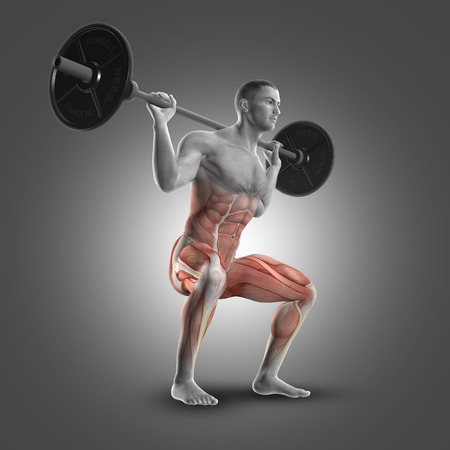Do you have lower-back pain? Squats got you down? You need to determine what triggers your back pain and then, remove the cause. Doing sit ups, yoga, crunches and other exercises will not help nor generally, will going to the doctor or insurance company. After find out what triggers your lower-back pain, you need to develop good core strength so that your core stabilizes your lower back. Trust me, I know because I’ve been there. Sometimes back pain can be so irritating as to cause spasms that make it unable for the one who has them to even walk.
You need to remember that your back is essentially a stack of aligned vertebrae cushioned by gel-filled discs. It has a natural, concave curvature that should be maintained. It’s not a big deal if you curve your back outward into a convex position if you do not have a load on it. The lower back is naturally in a concave position and should be kept there always when bearing a load, i.e., such as doing squats in the gym.
By letting your back curve outward, i.e., go into a convex position during heavy lifting exercises, the compression on the discs can cause them to loosen and divide, which can cause problems. Given enough pressure, the gel within can squirt out between the fibers and then harden, where it can press on nerves, result in bulging disc(s), and thus, create pain. Thus, you can see why certain exercises are not ideal – a sit up is one of them.
Advertisement: CytoCharge (click on photo for more info)

The back is not a straight line and thus, it is the muscles that stiffen the back so it can bear the load you’re putting on it. It’s usually the lightest and or the heaviest loads that we put on the back that cause the problem with potential injury, not because of just the weight, but because many have poor technique.
You need to fix your technique to lift heavy and prevent lower back injury.
Fix Your Technique
What is the ideal squat form? Many will tell you that you should squat deep, until your butt almost touches the floor. Wrong! Few people can squat this deep successfully without causing potential back injury, which can take up to 10 years to heal.
An ideal form would begin with feet approximately shoulder width apart, toes pointing slightly outward away from the body so that when you squat, the direction of your knee follows your toe; eyes are straight ahead and your squat is deep enough so that your thighs are about parallel to the floor. However, there’s a little more to it because each of us are uniquely different. For some, if you squat until your thighs are parallel to the floor, your back can become convex in shape and now, you are no longer in good form for a squat, which can cause injury.
So, what do you do? You need to find the squat position that is ideal for you, not for anyone else. Using the basic idea above, test yourself on the floor.
Get down on your hands and knees. Place your hands directly beneath your shoulders, but put your knees (your thighs at this point are perpendicular to the floor, i.e., about straight up) about four to six inches apart to begin. Now, slowly push your hips back until you begin to feel movement in your lower back – this indicates your back is beginning to lose its arch. At this point, widen your knees further apart and repeat the motion. You will keep doing this until you find the deepest range of motion without any change to your lower back. Try it with and without your feet being angled. You will likely find that your stance width is much different than you have been using. The next time you go to the gym, use this new stance you have found for yourself. But, a word of caution, use only light weights at first because likely your muscles will not be accustomed to the heavier loads since now you have slightly different angles pushing those loads.
Advertisement: Don Tolman International (click on photo for more info)

What are some things that will help you be more persistent in protecting your back? Try the following every day:
1. Perform a core-strength exercise such as side bridge, curl up, etc. If it’s a lift day, do one of these in your warmup routines as they will help stiffen the back prior to squats;
2. Do in-place squats, body weight only, every day; just a couple of sets to keep your hips mobile without the risk of heavy weights; and
3. On workout days, and I cannot stress this enough, wear a weight belt once you near your body weight and or surpass it. Then, when you squat, inhale before you squat, perform the squat and stand back to starting position then, exhale. This will keep your diaphragm expanded and is great at helping to prevent your back going into a convex position under heavy load.
There is a way to treat your back pains, but you need to be persistent. And the 8-12 weeks’ repair time that insurance companies say is ideal it not. It can take years to recover from damage to your back that you have done yourself. Happy, pain-free lifting.







